Podcast:
Stephen Fratus and I had the pleasure of sitting down and chatting with Christian Cameron on a number of topics, including: Ancient Greece, Medieval Italy and the canals of Venice, all the way from the city’s conception to the mid-17th Century. It was a conversation that could’ve lasted four or five hours—but Fortuna wouldn’t be so bold. Christian is a brilliant scholar, with some unbelievable life experiences that have undoubtedly aided his ability to craft some of the greatest historical fiction in the modern era. In this podcast we dove deep into the history and the immersive worlds that rendered William Gold, Richard Hughes, Tom Swan, and a host of other colorful characters that comprise the epic anthology of Christian’s work.
Christian is not only a brilliant historian and author, he's also a tremendous fencer. He boasts over 40 years of historical martial arts and fencing experience, preferring the stylings of Fiore, Manciolino and Marozzo, as any well adjusted human being should. Here he is fencing with Sword and Rotella (Green) against Phil Swift (Blue) with two swords.
Of course, this tremendous resume hasn't satiated Christian’s desire to live history—and perhaps it never could—as he's perpetually found himself exploring new avenues of re-creation and adventure. Among these endeavors, he’s been a leader in the development of Historical Hoplomachia, and a stalwart in the Harnessfechten or armored fighting community in North America, and even taken part in some American Revolution reenactments.
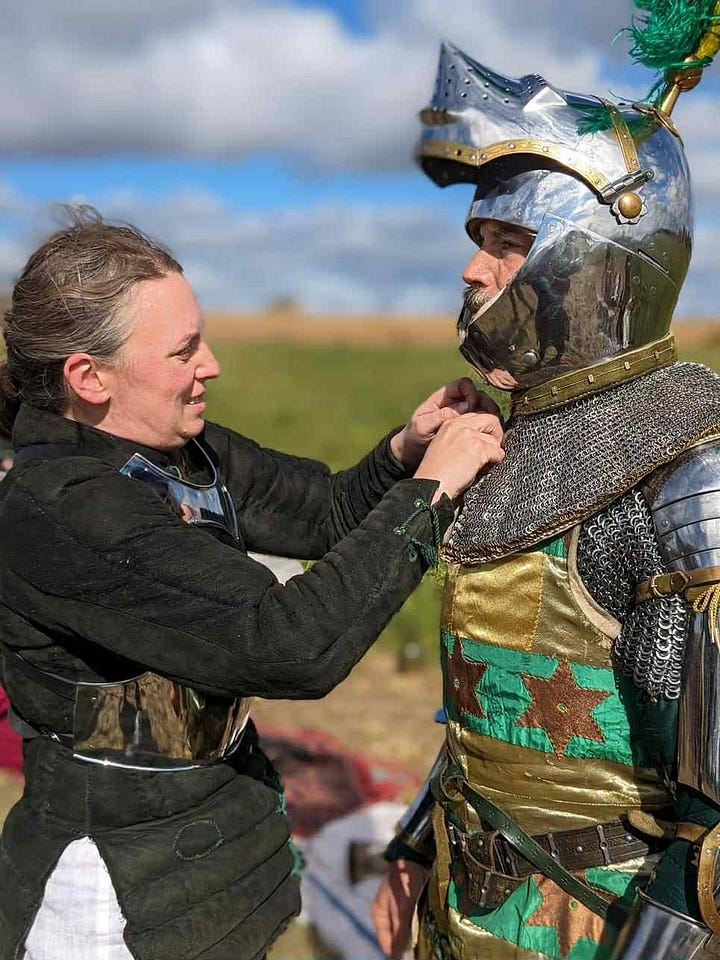
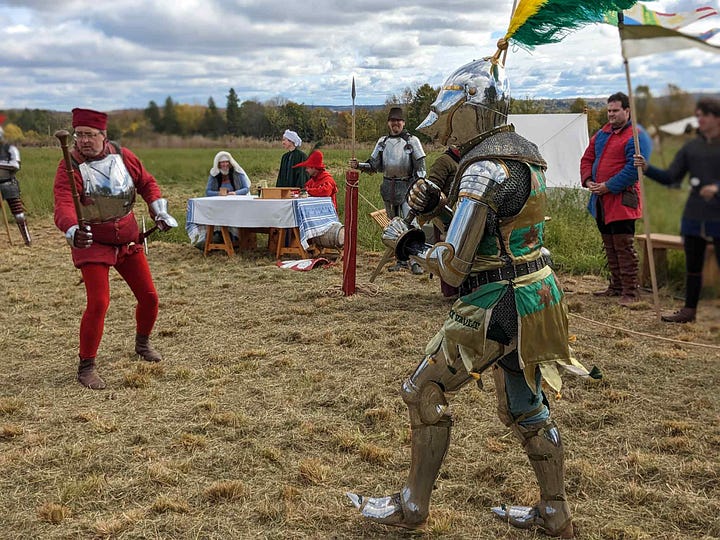
I’ll wrap-up this introduction with this, beyond the embodiment of a true Renaissance Man and a worthy Courtier, Christian is a lovely human being, and a joy to talk to. I think you’ll get a lot out of this conversation, as I know both Stephen and I did. So, once you’ve read my review of the Venetian Heretic below, hit play—relax—and enjoy.
One last thing! Go check out his fundraising event, Deed of Alms 2025. Christian said, if you sponsor him as a fighter for $15 he fights a bout to one blow; $100 a full bout, for $500 he’ll send you an advanced copy of Captain of Venice, the sequel to the Venetian Heretic, next March. All proceeds go to support the West Neighbourhood House, and Ukrainian Refugees who are working on building new lives in Canada.
Venetian Heretic Review:
Christian Cameron is—quite simply—a master of his craft. Many of you will undoubtedly be familiar with his Chivalry Series (featuring the epic tales of William Gold), or even his dynamic digital series, the Adventures of Tom Swan. Of course, the depth and breadth of Christian’s publications spans well beyond the Medieval and Renaissance landscape, venturing as far afield as Ancient Greece and Outer Space.
From what I have read of his works, I feel confident in saying that he’s become a titan of the historical fiction genre. Perhaps it is my proximity to WMA that colors my opinion here, but with the Venetian Heretic—and his cadre of other publications (notably Tom Swan and William Gold), he's moved past Conn Iggulden, Simon Scarrow, Giles Kristian, and even the venerable Bernard Cromwell to sit beside Stephen Pressfield atop my shelf of historical fiction favorites.
One hallmark of his writing style that has always intrigued me is the way he transitions between first person narrative styles. One moment his character is telling a story, then you're seamlessly transported into the story, only for the character to—almost break the fourth wall to remind you that this is the character relating their story. It's magical, and makes all of his books as well suited for an audiobook, as a warm blanket beside a fire in the dead of winter. It's intimate and wholesome.
The Venetian Heretic covers one of our favorite topics here at the Art of Arm: the incredible reach of the Serenissima. The story is set in the canals of mid-17th century Venice, and follows the ‘down on his luck’ English fencing instructor Richard Hughes. The story is equal parts murder mystery and political thriller, that's chock-full of twists and turns, dynamic characters, and scrumptious historical detail.
As I was listening to the Venetian Heretic—driving to and from vacation with my family—I couldn't help but pause, and think of a bevy of historical anecdotes that reinforced the tropes that were playing out in the story. I'm doing my best to not give any spoilers here, but if you've been following along with our publications or podcasts, you'll probably find yourself thinking the same thing. I guarantee it!
Another aspect of Christian’s writing that I enjoy, is that he has a marvelous way of working alliteration and prose into his descriptions of the palazzos and canals of Venice. His love for the city is tangible in the metered runs that detail the color, architecture, grandiosity and decay of the floating city.
A critique that I've seen about Venetian Heretic, is that the pacing is a bit slow. I can only imagine these fine folks mean the points where the plot and action are not moving forward, and presume they’re referring to the moments when Richard is back home. I fundamentally disagree with this critique, I found the slower moments of the book to be incredibly charming, they were relaxed and character driven. They allowed you to see the depth of Richard Hughes, Filippo, and others in a way that I would personally like to see more authors explore. Obviously, it's a delicate balance, but in the Venetian Heretic, I think Christian gets it just right! Furthermore, everything that happens at home in this story finds its way into or helps set-up some of the books biggest reveals, and in retrospect are as important to the development of the plot as the more obvious or harrowing moments.
In typical Christian Cameron fashion, historical martial arts also plays an integral role in the story, and there's an appearance from a fencing master of repute. So, even if you're a sword nerd or a HEMA jock who doesn't care for the history much, you’ll find this book quite enjoyable, and probably quite humorous at times. There's a little something for everyone.
Final Thoughts:
This story, with its level of research and historical detail in concert with a cast of delicately sculpted characters all ensconced in a riveting adventure will almost assuredly transport you to the streets of the Most Serene Republic. There are moments of real poetry in Christians descriptions of the Palazzo’s and Canals. It's masterfully written. I can't recommend it enough!
My review:
10/10
You can find The Venetian Heretic almost anywhere books are sold. Here is an Amazon link. If you're a fan of Audiobooks, or have a road trip coming up—like I did—then you can't go wrong with Peter Noble’s narration, it's absolutely brilliant! Check out Christians Website for a complete view of his extensive publications HERE. Christian mentioned digital archives in the podcast, and they can be found HERE.
After you've read the book make sure to check out some of our Venetian themed merch on our webstore: https://the-art-of-arms.printify.me/


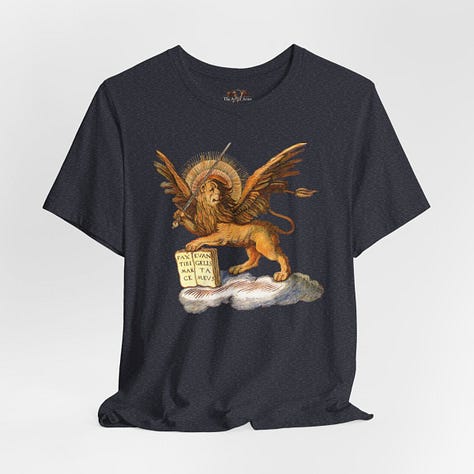
If you can’t tell we love Venice…almost as much as we love Bologna. Almost.
Marco!
Suggested Further Reading:
One Bad Motherf***er; is about Andre Gritti (our favorite Doge), Quest for Manciolino: Part 3; has more details about the story of Nicolo lo Zoppino (Manciolino’s printer/publisher), How Fiore dei Liberi’s Protege Helped Put the Bentivoglio Family in Power: Chapter 2; discusses the Pitti story that we briefly discussed, and the Knights of Viola article has information related to Christians theory. Go check them out!
The Quest for Manciolino: Printers Part 3
Nicolò ‘lo Zoppino’ d’Aristotile d’Rossi was born in Ferrara sometime around the year 1478. His father, Aristotile d’Rossi was a notary in the city, and provided a quaint middle-class life for the d’Rossi household. While Nicolò wouldn't follow in his father’s footsteps, he would inevitably use the skills, literacy, and penmanship inherent in his father’s trade to forge his own illustrious career as a publisher, typographer, illustrator, and bookseller. The nickname, lo Zoppino, often attributed to Nicolò seems to have been a reference to the fact that he walked with a limp, however it’s unclear if this was a birth defect or a result of an accident in his childhood, regardless, the nickname would follow him throughout his life and into the back-alleys of Venice where it would take on a life of its own.
How Fiore dei Liberi's Protege Helped Put the Bentivoglio Family in Power: Chapter 2
The poisonous promises of freedom, liberty and independence weighed heavy on Giovanni Bentivoglio’s mind. The Venetians and Florentines made a compelling case that if Faenza were to fall, Bologna would be next—no matter Giovanni’s relationship with Gian Galeazzo Visconti. Their case was made even more compelling by recent events in Pisa, where the Raspanti leader Iacopo Appiani, who upon throwing off the yoke of the Della Gherardesca family to become Signoria, was forced to seek the support of the Visconti to maintain his position against the Florentines, but rather than support the claim of Iacopo, the 10,000 man Visconti army led-then by Alberigo da Barbiano, supported a rebel faction in Pisa and tried to depose Iacopo.


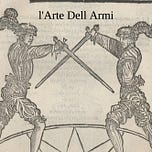


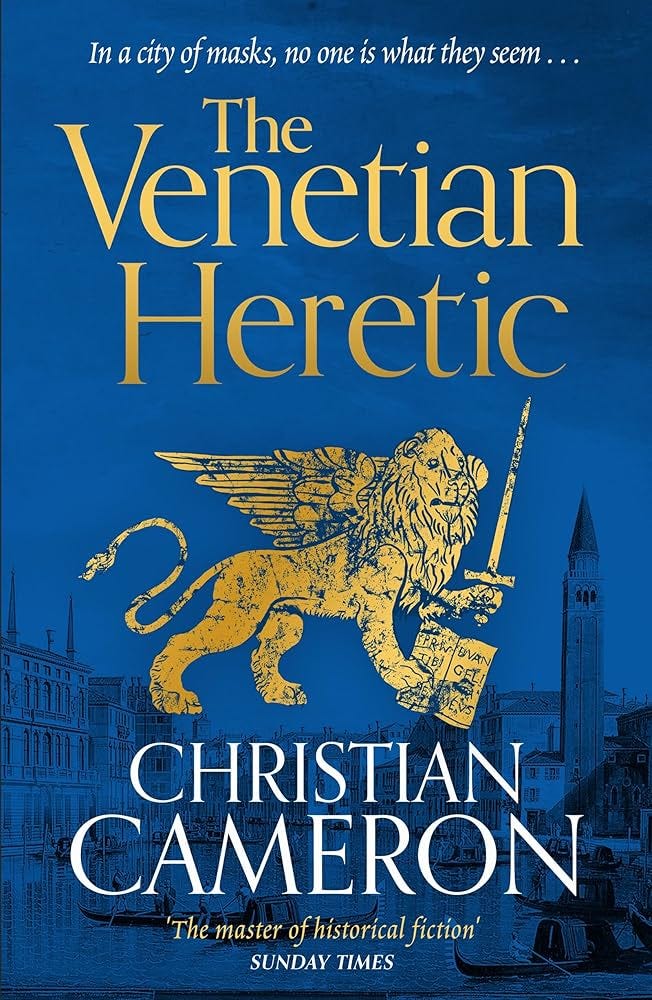
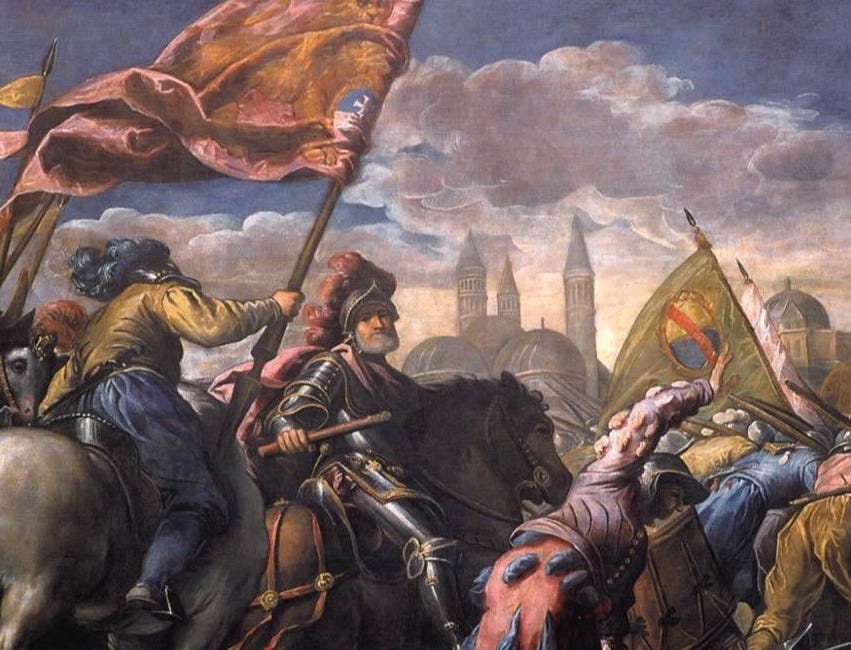
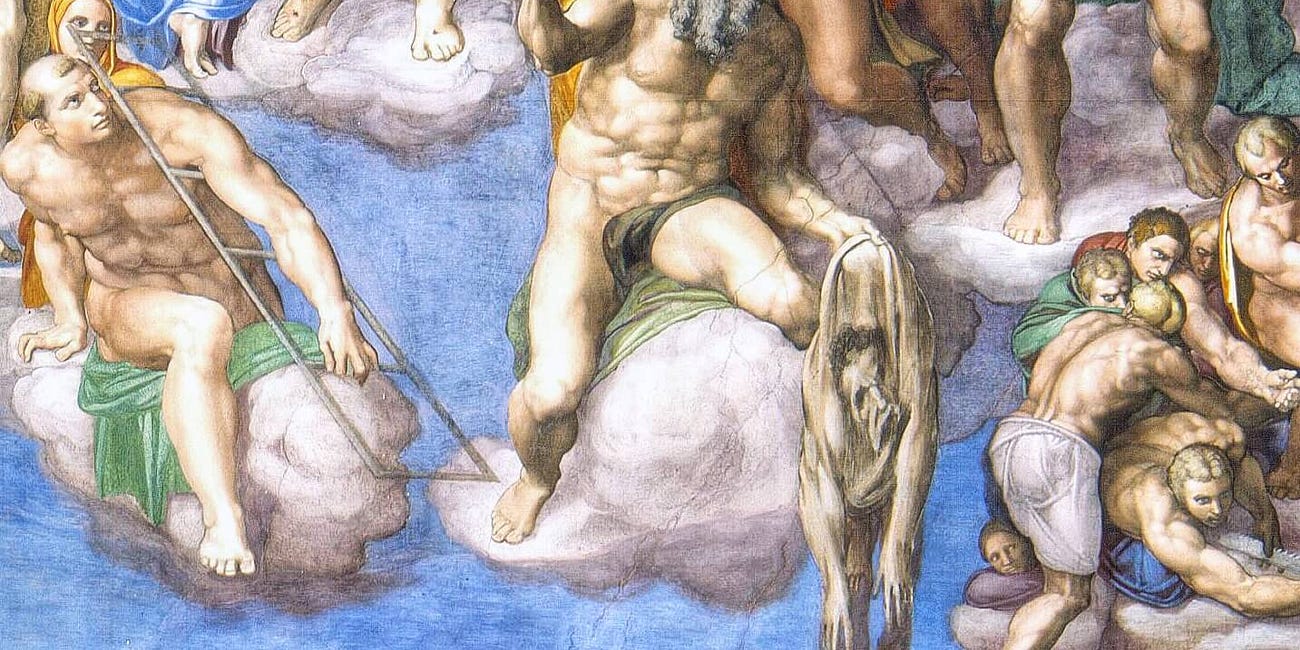
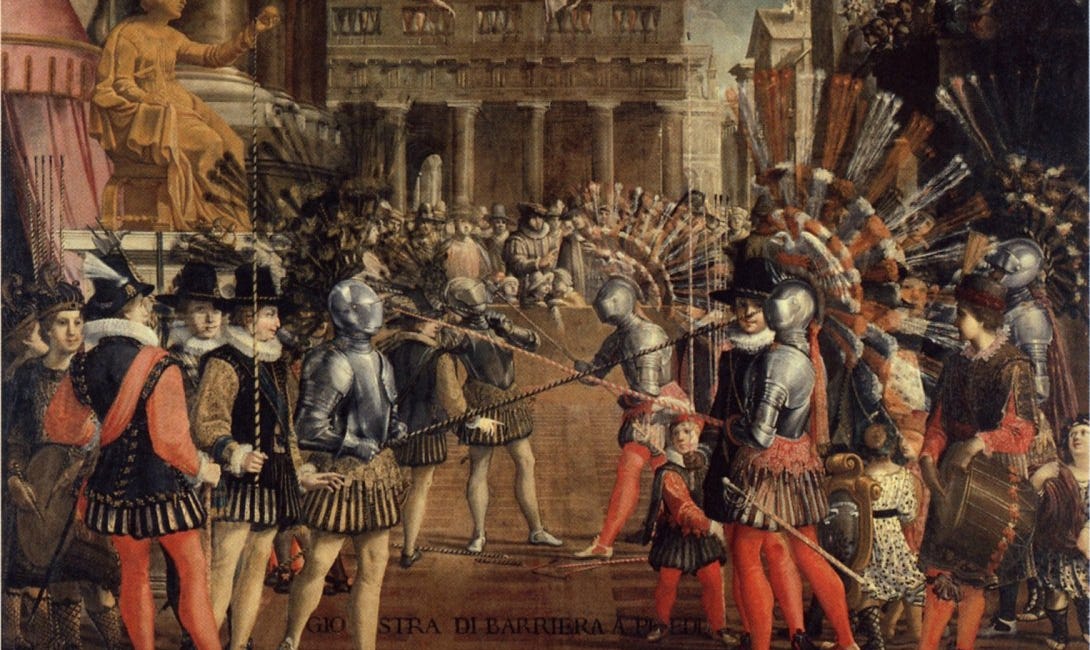
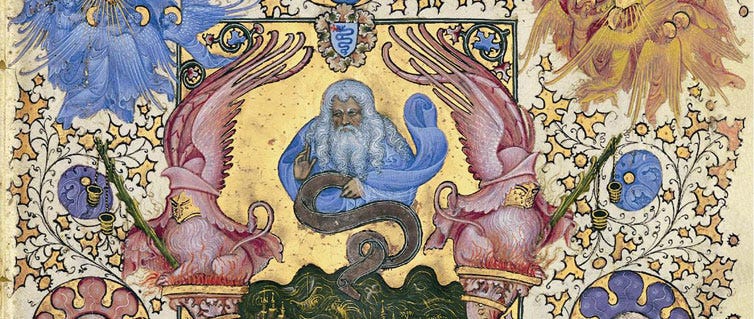








Share this post